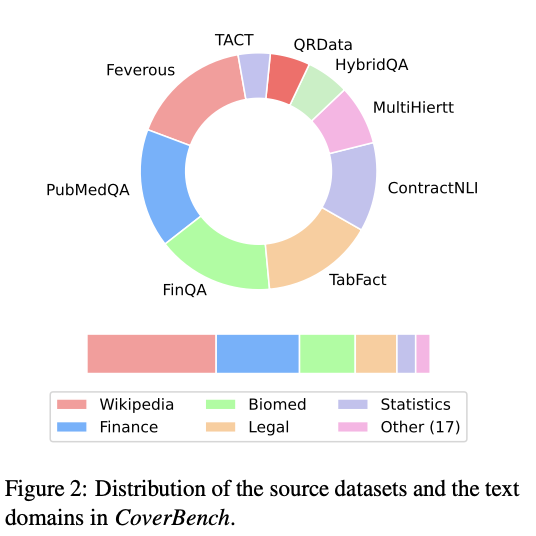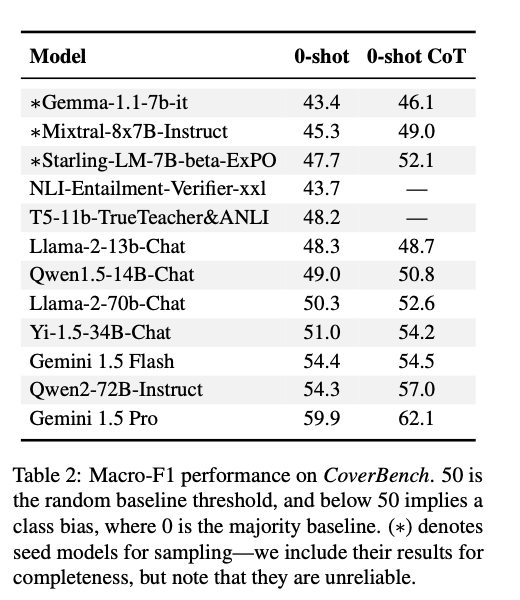One of the main challenges in ai research is verifying the accuracy of language model (LM) outputs, especially in contexts that require complex reasoning. As LMs are increasingly used for complex queries that demand multiple reasoning steps, domain expertise, and quantitative analysis, ensuring the accuracy and reliability of these models is crucial. This task is particularly important in fields such as finance, law, and biomedicine, where incorrect information can lead to significant adverse outcomes.
Current methods for verifying LM results include fact-checking techniques and natural language inference (NLI). These methods typically rely on datasets designed for specific reasoning tasks, such as question answering (QA) or financial analysis. However, these datasets are not designed for claim verification, and existing methods suffer from limitations such as high computational complexity, reliance on large volumes of labeled data, and inadequate performance on tasks requiring long context reasoning or multi-hop inferences. High label noise and the domain-specific nature of many datasets further hamper the generalization and applicability of these methods in broader contexts.
A team of researchers from Google and Tel Aviv University proposed CoverBench, a benchmark specifically designed to evaluate the verification of complex claims across diverse domains and reasoning types. CoverBench addresses the limitations of existing methods by providing a unified format and a diverse set of 733 examples that require complex reasoning, including extensive context understanding, multi-step reasoning, and quantitative analysis. The benchmark includes true and false claims vetted for quality, ensuring low levels of noise in the labels. This novel approach enables a comprehensive evaluation of LM’s verification capabilities, highlighting areas in need of improvement and setting a higher standard for claim verification tasks.
CoverBench includes datasets from nine different sources including FinQA, QRData, TabFact, MultiHiertt, HybridQA, ContractNLI, PubMedQA, TACT, and Feverous. These datasets cover a variety of domains such as finance, Wikipedia, biomedicine, legal, and statistics. The benchmark involves converting various QA tasks into declarative assertions, standardizing table representations, and generating negative examples using seed models such as GPT-4. The final dataset contains long input contexts, averaging 3,500 tokens, which challenge the capabilities of current models. The datasets were manually vetted to ensure assertion accuracy and difficulty.

The CoverBench evaluation demonstrates that current competitive LMs struggle significantly with the tasks presented, achieving performance close to the random benchmark in many cases. The highest performing models, such as Gemini 1.5 Pro, achieved a Macro-F1 score of 62.1, indicating substantial room for improvement. In contrast, models such as Gemma-1.1-7b-it performed much worse, underscoring the difficulty of the benchmark. These results highlight the challenges LMs face in verifying complex claims and the significant room for advancements in this area.

In conclusion, CoverBench significantly contributes to ai research by providing a challenging benchmark for complex claims verification. It overcomes the limitations of existing datasets by offering a diverse set of tasks that require multi-step reasoning, long-term context understanding, and quantitative analysis. The thorough evaluation of the benchmark reveals that current LMs have substantial room for improvement in these areas. CoverBench thus sets a new standard for claims verification, pushing the boundaries of what LMs can achieve on complex reasoning tasks.
Review the PaperAll credit for this research goes to the researchers of this project. Also, don't forget to follow us on twitter.com/Marktechpost”>twitter and join our Telegram Channel and LinkedIn GrAbove!. If you like our work, you will love our Newsletter..
Don't forget to join our Subreddit with over 48 billion users
Find upcoming ai webinars here
Aswin AK is a Consulting Intern at MarkTechPost. He is pursuing his dual degree from Indian Institute of technology, Kharagpur. He is passionate about Data Science and Machine Learning and has a strong academic background and practical experience in solving real-world interdisciplinary challenges.
<script async src="//platform.twitter.com/widgets.js” charset=”utf-8″>
 NEWSLETTER
NEWSLETTER





